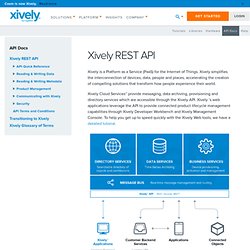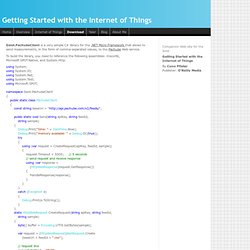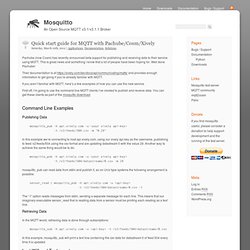

Cosm - Weather Shield for Arduino. Updating a feed - Cosm API Documentation. Xively is a Platform as a Service (PaaS) for the Internet of Things.

Xively simplifies the interconnection of devices, data, people and places, accelerating the creation of compelling solutions that transform how people experience their world. Xively Cloud Services™ provide messaging, data archiving, provisioning and directory services which are accessible through the Xively API. Xively ’s web applications leverage the API to provide connected product lifecycle management capabilities through Xively Developer Workbench and Xively Management Console. To help you get up to speed quickly with the Xively Web tools, we have a detailed tutorial.
The Xively API makes it quick and easy to create products that connect across the Internet of Things. A hierarchy of data types is used to represent data in the Xively platform: The Xively API documentation is intended to help you understand and utilize the Xively API. Supporting elements of the API provide security and communications capabilities. COSM Community. Coding and the API For code and programming questions, pose them to the Xively community on Stack Overflow.

Many of our engineers actively participate in responding to questions there, alongside topic experts in various programming languages and hardware platforms under the 'Xively' tag. It's a great place to troubleshoot code you’ve been working on, and look for related questions. For technical questions that don't contain code and aren't answered by the API Docs, check the FAQs under 'Using Xively'. PachubeClient - Getting Started with the Internet of Things. Gsiot.PachubeClient is a very simple C# library for the .NET Micro Framework that allows to send measurements, in the form of comma-separated values, to the Pachube Web service.

To build the library, you need to reference the following assemblies: mscorlib, Microsoft.SPOT.Native, and System.Http. using System; using System.IO; using System.Net; using System.Text; using Microsoft.SPOT; namespace Gsiot.PachubeClient { public static class PachubeClient { const string baseUri = " static HttpWebRequest CreateRequest(string apiKey, string feedId, string sample) { byte[] buffer = Encoding.UTF8.GetBytes(sample); var request = (HttpWebRequest)WebRequest.Create (baseUri + feedId + ".csv"); // request line request.Method = "PUT"; // request headers request.ContentLength = buffer.Length; request.ContentType = "text/csv"; request.Headers.Add("X-PachubeApiKey", apiKey); // request body using (Stream stream = request.GetRequestStream()) { stream.Write(buffer, 0, buffer.Length); } return request; }
Quick start guide for MQTT with Pachube/Cosm. Pachube (now Cosm) has recently announced beta support for publishing and receiving data to their service using MQTT.

This is great news and something I know that a lot of people have been hoping for. Well done Pachube! Their documentation is at and provides enough information to get going if you’re already familiar with MQTT. If you aren’t familiar with MQTT, here’s a few examples of how you can use the new service. First off, I’m going to use the command line MQTT clients I’ve created to publish and receive data. Command Line Examples Publishing Data mosquitto_pub -h api.xively.com -u <your xively api-key> -t /v2/feeds/504.csv -m "0,29" In this example we’re connecting to host api.xively.com, using our xively api-key as the username, publishing to feed /v2/feeds/504 using the csv format and are updating datastream 0 with the value 29. Mosquitto_pub -h api.xively.com -u <your xively api-key> -t /v2/feeds/504/datastreams/0.csv -m 29 Retrieving Data Last Will and Testament MQTT Beyond Xively.